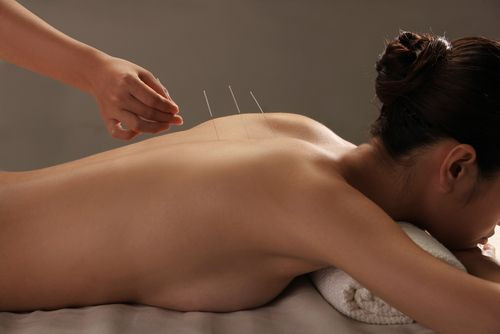Fake Acupuncture As Good As The Real Thing: Breast Cancer Patients Had Fewer Chemo Side Effects Either Way

Breast cancer patients who are prescribed aromatase inhibitors, to stall the production of estrogen, often experience menopausal symptoms, such as hot flashes, in addition to joint/muscle pain and stiffness, and other side effects. In a recent study, researchers from both the University of Maryland as well as Johns Hopkins University, discovered that acupuncture treatments helped to alleviate these side effects from the aromatase inhibitors — and fake acupuncture lessened the negative symptoms as well!
"It could be that there is no difference [between real and fake acupuncture], or it could be that in this small trial we just didn't have enough patients to detect a significant difference," Dr. Ting Bao from the University of Maryland Greenebaum Cancer Center in Baltimore, stated in a press release.
The Real Thing
To understand the potential benefits of acupuncture, Bao and her colleagues enlisted the help of 47 breast cancer patients who suffered side effects while taking aromatase inhibitors. This is a common post-operative treatment because so many breast tumors are sensitive to estrogen — the hormone, in fact, fuels their growth. Aromatase inhibitors, then, simply lower the amount of estrogen in a woman's body as a way of blocking the development of tumors. Unfortunately, these beneficial drugs also cause menopausal symptoms and joint/muscle discomfort for many patients.
For the study, half of the patients received weekly acupuncture treatments over the course of two months, while the remaining patients received sham acupuncture that involved non-penetrating retractable needles placed on non-acupuncture points. Happily for the women involved in this clinical trial, both groups experienced a lessening of their symptoms, in particular, their hot flashes. In fact, the researchers found little difference between the real acupuncture and the sham acupuncture. They also discovered that, compared to women of other races, African-American women experienced a greater reduction in both severity and frequency of hot flashes with the real acupuncture as opposed to the fake acupuncture.
"It does suggest that we should probably look further into the possibility that acupuncture may work better in some ethnicity groups than others," Bao said. Her results also raise the question of whether sham acupuncture may have beneficial effects on its own. Regardless, the results of this clinical trial offer evidence that acupuncture produces no side effects, a very significant finding because many treatments for the side effects resulting from chemo simply create more symptoms and side effects. Meanwhile, other research teams continue to track the effects of acupuncture for cancer patients.
Studying the Studies
To assess potential acupuncture benefits, scientists at the University of Hong Kong reviewed and evaluated available randomized clinical trials regarding the effectiveness of acupuncture in palliative care for cancer patients. They began by searching seven databases for randomized clinical trials, and then they validated and extracted data from 33 eligible trials. They discovered positive effects from acupuncture when used for chemotherapy or radiotherapy-induced side effects 39.4 percent of the time, cancer pain 18.2 percent of the time, and post-operative urinary retention 12.1 percent of the time. Acupuncture also showed a lower percentage of positive effects on quality of life, vasomotor syndrome, post-operative gastrointestinal dysfunction, joint symptoms, and immunomodulation.
“The result of our systematic review suggested that the effectiveness of acupuncture in palliative care for cancer patients is promising, especially in reducing chemotherapy or radiotherapy-induced side effects and cancer pain,” the authors wrote in their conclusion. Whether real or sham, acupuncture may be a worthy and appropriate treatment for many suffering cancer patients.
Sources: Bao T, Cai L, Snyder C, et al. Patient-reported outcomes in women with breast cancer enrolled in a dual-center, double-blind, randomized controlled trial assessing the effect of acupuncture in reducing aromatase inhibitor-induced musculoskeletal symptoms. Cancer. 2013.
Lian WL, Pan MQ, Zhou DH, Zhang ZJ. Effectiveness of acupuncture for palliative care in cancer patients: A systematic review. Chinese Journal of Integrative Medicine. 2013.
Published by Medicaldaily.com



























